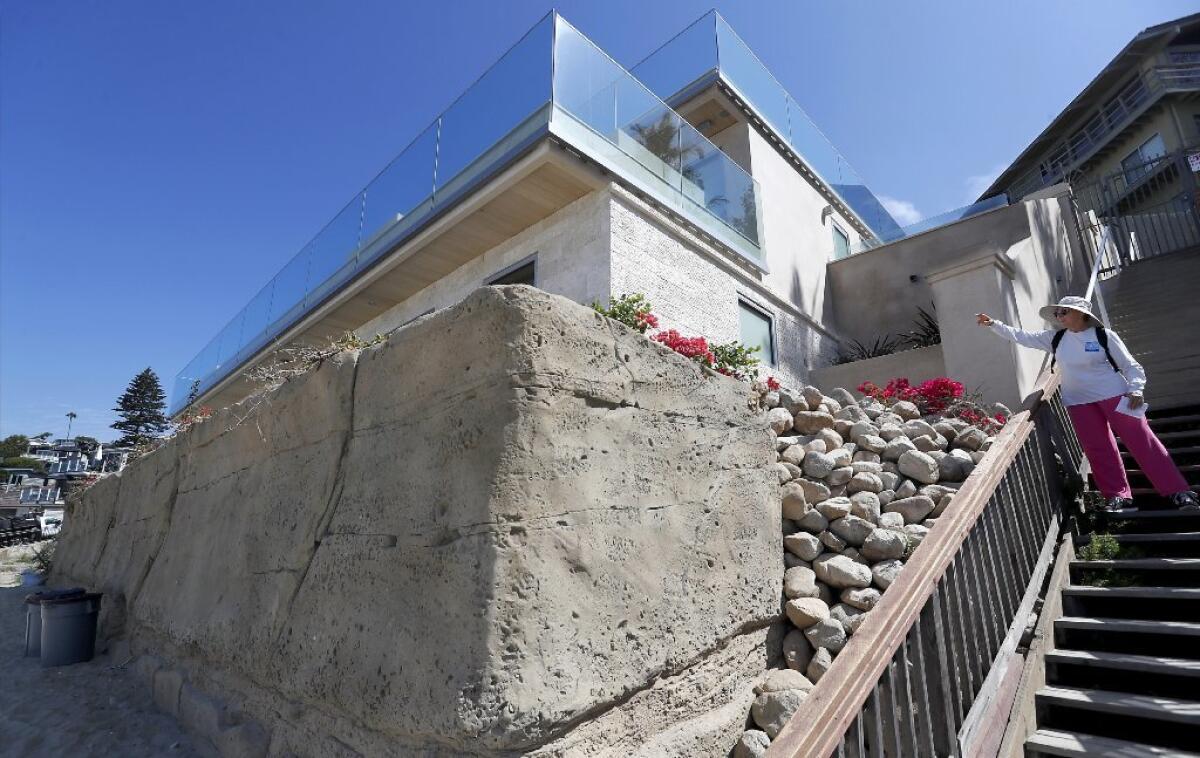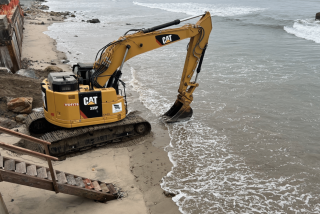Coastal officials vote to tear down sea wall protecting Laguna Beach mansion

- Share via
The California Coastal Commission voted unanimously Thursday to order a Laguna Beach couple to pay $1 million in fines and tear down a sea wall that officials say protects a single mansion from erosion at the expense of the public beach in front.
The decision prioritizes the rights of beachgoers over those of property owners, easing concerns among coastal advocates that the case could prompt more sea wall construction in a state that has long limited such reinforcement to emergencies.
“The sea wall needs to come down immediately,” Commissioner Donne Brownsey said. “This case is important in and of itself, but it’s also important as a harbinger of the issues that we’re going to have to face because of sea level rise, because of the certain knowledge that we now have that sea walls are destructive to our beaches.”
The vote came the same day the commission passed a resolution to ensure that sea walls are “only permitted if necessary and if no less environmentally damaging feasible alternative is available.” Sea walls can obstruct the natural flow and replenishment of sand, leading to smaller and smaller beaches until the sand disappears altogether.
Jeffrey and Tracy Katz, the owners of a 4,878-square-foot home that juts farther seaward and at a lower elevation than the surrounding properties along a stretch of coast known as Victoria Beach, said through their attorney that the law and facts were on their side. Without this sea wall, they said, millions of dollars could be lost to erosion and the rising sea.
Citing technical consultants who analyzed the beach and property, attorney Steven Kaufmann said that “there is no site-specific evidence” that the sea wall had any impact on the beach. He presented a photo from last weekend of beachgoers enjoying the sand in front of the home.
“It’s a wide and well-used beach,” he told commissioners. “No one is prevented from using this beach.”

Read more about the battle over the Katz’s sea wall »
The Katzes must tear down the wall within 60 days. The commission is also urging the couple to work with the state to find an alternative way to protect the home so that it does not require a sea wall.
This could involve moving the house farther back from waves that are known to slam right onto the shore during intense storms, officials said, or perhaps reconfiguring the most seaward part of the home.
Robert Moddelmog, an enforcement analyst for the commission, said they brought this issue before commissioners after numerous attempts to get the Katzes to stop new construction.
The most important issue at hand, he said, is the future of Victoria Beach.
“In the end, it’s the public who loses if the Katzes’ violation remains in place, especially the next generation of beachgoers,” he said. “We have worked hard to craft a proposal that still allows the Katzes to apply to retain the portions of the home that do not need a sea wall, and to modify the house consistent with the law. It requires that they be held accountable, by removing the sea wall.”
Kaufmann said the sea wall and the work on the house was legal, approved by the city of Laguna Beach and did not require additional state permission.
After a number of severe storms, the commission in 2005 had granted an emergency permit for a temporary 80-foot-long sea wall at the property. The next time “new development” occurred, the commission later ordered, the wall would have to come down.
Citing past permits and city codes, Kaufmann said the sea wall did not have to come down until the house underwent a “major remodel” — which he argued requires demolition of at least 50% of the actual frame. Enforcement officials went out of their way to skew the facts, he said, and recommended tearing down the sea wall based on biased photographs rather than a fair investigation.
In a preemptive lawsuit against the commission earlier this year, Kaufmann said threats over the sea wall “have had a devastating impact on the value and marketability of the residence,” hindering the owners’ ability to rent the property for $70,000 per month or sell it for its appraised price of $25 million.
The courts stayed the lawsuit, saying the owners should go through the administrative process first.
Kaufmann declined to be interviewed after the vote. He said he will review next steps with his client.
Commissioners, after hearing the arguments and examining the hundreds of pages of photos, letters and reports — even looking up the dictionary definition of the word “sand” — acknowledged that the balance between protecting property rights and beach access isn’t easy.
But in the case of the Katzes, they said they were appalled by how far the owners went to avoid the commission’s oversight.
Enforcement officials, in an attempt to get the owners to work with the state to find a way to save both the home and the beach, had suggested a penalty of $500,000. They recommended the commissioners give the owners 75 days to submit a removal plan and one year to demolish the wall.
Commissioners instead demanded the demolition of the wall and $1 million to be paid within 60 days.
The owners should have known that they were “going to have to deal with us one way or the other,” Chairwoman Dayna Bochco said. “You’re on the beach, you just can’t get away with this stuff.”
Interested in coastal issues? Follow @RosannaXia on Twitter.
More to Read
Sign up for Essential California
The most important California stories and recommendations in your inbox every morning.
You may occasionally receive promotional content from the Los Angeles Times.











